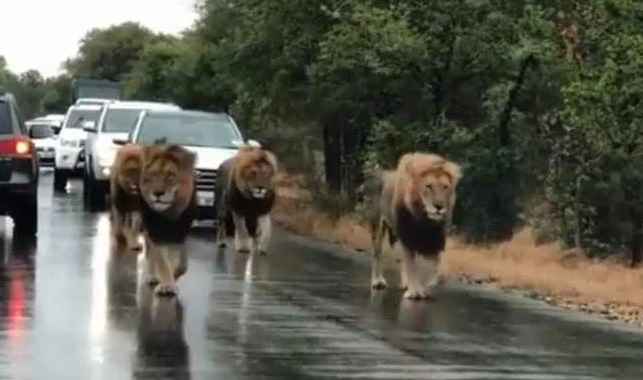Why do lions cross the road? This may seem like a simple question, but the answer is a bit more complex than one might think. In this article, we will delve into the reasons why lions cross roads, the potential dangers and safety concerns that arise from these crossings, and the conservation efforts being made to protect these majestic animals.

Reasons for lion crossing the road
Natural behavior and migration patterns of lions: Lions are territorial animals and they roam around searching for food and territory. They can cover large areas in search of prey and a suitable place to establish their territory.
In some cases, this means crossing roads in order to access different parts of their territory.
Search for food and territory: Lions, like all animals, need food to survive. Roads often bisect their natural habitats, separating lions from their prey. In such cases, lions may cross roads in search of food. Additionally, as lions establish and defend their territories, they may cross roads in order to access new areas to claim as their own.
Human impact on lion habitat and population: Unfortunately, human activities such as urbanization, agriculture, and mining often encroach on lion habitats. As a result, lions may be forced to cross roads in order to find new areas to live and hunt.
Additionally, human activities can also lead to a decline in lion populations, making it more likely for individual lions to cross roads as they search for a mate.
Safety concerns
Risk to lions and other animals when crossing roads: Lions and other animals that cross roads face a significant risk of being hit by vehicles. This not only poses a danger to the individual lion, but also to the overall lion population as a whole.
Additionally, the risk of road accidents can lead to injuries or deaths, which can have a negative impact on lion breeding and population growth.
Potential dangers to humans when lions cross roads near populated areas: While lions crossing roads near populated areas can be a concern for the animals themselves, it can also pose a potential danger to humans. If a lion is hit by a vehicle, it may become injured and aggressive, posing a risk to nearby humans.
Additionally, lions that have lost their natural fear of humans due to human encroachment on their habitats can also pose a danger to people living in or near these areas.
Conservation efforts
Measures taken to protect lions and other wildlife from road accidents: In order to protect lions and other wildlife from the dangers of road accidents, conservationists and government agencies are implementing various measures.
These include building wildlife crossings and underpasses, reducing speed limits in areas where lions are known to cross, and educating the public about the dangers of speeding in these areas.
Efforts to preserve lion habitat and populations: In addition to protecting lions from road accidents, conservationists are also working to preserve lion habitats and populations. This includes efforts to protect and restore natural habitats, as well as breeding programs to increase lion populations in areas where they have been depleted.

Conclusion
As we can see, there are many reasons why lions cross roads, from natural behavior and migration patterns to the impact of human activities on lion habitats. While these crossings can pose a danger to both lions and humans, conservation efforts are being made to protect these magnificent animals and reduce the risk of road accidents.
Understanding the reasons for lion road crossings is crucial for the preservation of these animals and the safety of both lions and humans.
How can I tell if a lion is crossing the road near my home?
Signs of lion activity near a road can include tracks, scat, or sightings of the animal. If you live in an area where lions are known to cross roads, be aware of your surroundings and look for these signs when driving. Additionally, local government or conservation agencies may also post warning signs or alerts in areas where lions are known to cross.
Is it safe to drive through an area where lions are known to cross?
While it is generally safe to drive through an area where lions are known to cross, it is important to be aware of your surroundings and obey posted speed limits. Additionally, it is best to avoid driving at night, when lions are most active and visibility is low.
How can I help protect lions from road accidents?
One way to help protect lions from road accidents is to obey posted speed limits in areas where lions are known to cross. Additionally, supporting conservation organizations that work to protect lion habitats and breeding programs can also help to ensure the survival of these magnificent animals.
Are there any laws in place to protect lions from road accidents?
Many countries have laws in place to protect lions and other wildlife from road accidents. These may include regulations on speed limits in certain areas, fines for hitting wildlife with a vehicle, and penalties for poaching or hunting protected animals.
What should I do if I see a lion crossing the road?
If you see a lion crossing the road, it is important to remain calm and not try to approach the animal. Slow down and give the lion plenty of space. If you are in a car, do not stop or get out of the vehicle.
If you are on foot, slowly and calmly move away from the animal. If you are concerned for your safety or the safety of others, contact the local authorities or conservation agencies.
